Blog
What I Learned in Ten Years of Talent Coaching
April 22, 2017
Ten years ago this month, Terry Anzur Coaching Services was born.

Terry Anzur Coaching Services launched 10 years ago at an RTDNA conference like this one in Las Vegas.
I launched my one-woman company with a bank account, a web site and a trip to Las Vegas to network with potential clients at RTDNA. Friends from a major consulting firm backed me right away. Thank you Smith-Geiger! A decade later, the core of my business remains coaching in TV stations and web sites that do video. I’ve also coached hundreds of individuals via Skype or in person, including journalists and public relations professionals. My services are confidential, so I don’t publish a client list. What I can share are the lessons learned from 10 years of talent coaching:
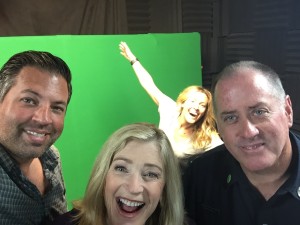
Selfie photobombed by our makeup artist while making a public relations training video for LACFD.
Listening is an Underrated Skill
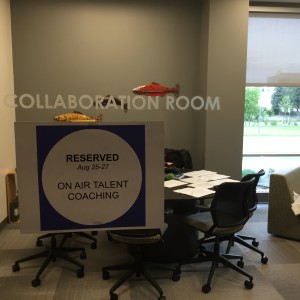
I’ve learned a lot while teaching — and listening — in TV station conference rooms like this one.
My first and most important job is, not to teach, but to really listen. “I never get any feedback!” is a common complaint from people who make their living in front of a camera. However, that same person’s manager may feel that constant feedback has been given, but not followed. It makes a difference if a manager’s goal is to make an established team more spontaneous and user-friendly, or to make inexperienced talent more confident and credible. During my two decades of anchoring and reporting, I remember being frustrated when the news director, the consultant and my mom would offer conflicting advice. As a talent coach, I listen to everyone and make sure my clients hear a consistent message that will put them on a path to real improvement.
There’s No Such Thing as One Size Fits All

Group sessions, like this one at APTRA in Palm Springs, are fun. But individual coaching is more likely to produce results.
Although some basic elements of my coaching session remain the same, the lesson plan I develop for each station — and for each individual within that station — has to be custom, custom, custom. A few stations have tried to have “group sessions” for reporters. I’m happy to do them, but they don’t work when everyone leaves the room thinking the tips apply to those other reporters in the room, but not me! Sitting down with each person — after I have gone over their work samples and made detailed notes, and discussing the specific changes needed for that individual’s improvement — is more likely to produce the desired results.
Market Size Doesn’t Matter
I’m not an agent and I don’t find jobs for people. However, the result of talent coaching is frequently the desired job promotion or move to a bigger market. Some agents send me their most promising clients for a tuneup. That said, I’ve encountered great journalists in small markets and weak ones who have made it to the Top 20 based on one strong point, such as their good looks. I’ve also seen promising talent held back by a few weak points, such as an unpleasant voice, sloppy appearance or unfocused storytelling.
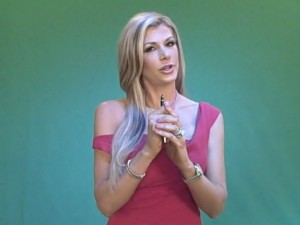
Coaching one of the “Real Housewives of Orange County” in TV hosting skills. The whole world got to sit in on this session, which was part of the storyline of the show.
The First Amendment is America’s Gift to the World
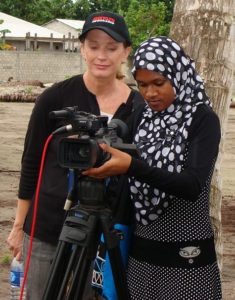
Beginning with the Maldives Media Project, I’ve taught fair and independent journalism around the world.
One of my first clients was the government of Maldives, which hired me and my team to prepare the state TV and radio stations for the country’s first democratic, multi-party elections. One of the first lessons I had to teach was the importance of the marketplace of ideas. We put the opposition parties on the air for the first time. We put real people on the air, not just government officials. Yes, freedom of speech is noisy and messy but government-regulated speech is not free speech — or real democracy. And it has to be tempered with journalistic ethics. Since then, I’ve been invited to teach in other emerging democracies. However, results can be slow or uneven. Each country or culture approaches free speech on its own timetable.

A gathering of women journalists in Karachi revealed areas of common ground.
Technology Changes, Not Basic Skills

New sets raise new questions about talent performance, like, “When is it OK to turn your back to the audience?” and, “How will I live without the prompter?”
Starting my own reporting career with some of the very first “live shots,” I had to manage a crew of four to five people. Fast forward to today’s MMJ’s, who are not only reporting, shooting, editing and presenting; they also have to deal with social media like Facebook live at the same time!
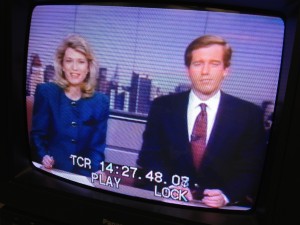
Technology has changed a lot during and since my time at the anchor desk. (Yes, that’s Brian Williams.)
At the anchor desk, paper scripts have been replaced by iPads. Giant, interactive screens on modern sets require less anchor dependence on reading from the prompter. When weather data or sports scores are instantly available on smart phones, presenters must offer something more than just the raw info. I invest a lot of time in making sure my own skills are up to date. However, the new technology and tools only magnify the problems that exist, if a performance is boring or filled with annoying verbal and visual distractions.
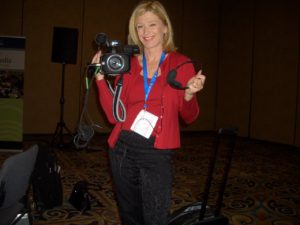
Updating my teaching skills for MMJs or Facebook Live.
So, Here’s to the Next Ten Years!
Another thing I’ve learned about talent coaching is that it runs in cycles. A busy year usually follows an election, when TV stations generally count on extra political revenue. Or, it’s a slow year because the money for coaching may have been spent to upgrade the set or the web site. But then what? You still have to upgrade the people. So, going forward, I’m launching a couple of new ventures for my coaching downtime. I miss telling stories, and I’ll have a chance to do that on my brand new travel blog website. I also get to some pretty interesting places during my busy talent coaching times, and I’m going to make more of an effort to see something besides the inside of my coaching room while I’m there (by staying an extra day or two at my own expense).
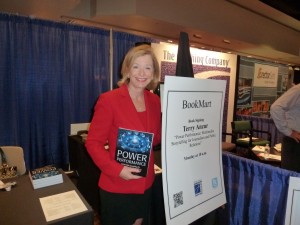
Terry Anzur and “Power Performance” at the EIJ bookmart in New Orleans. The next ten years will bring a new book and some new stories about my travels.
And I’m also working on a way to reach people who can’t get to a coaching session. A talent coaching e-book is coming soon. After 10 years of coaching urgent news delivery and future-driven weather, I’ve also learned that it’s always a good idea to tease ahead… and deliver. If you’re interested in talent coaching, I’d love to hear from you.
Tweet
Pleasure to meet you.
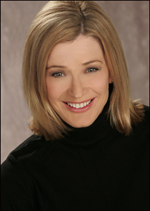 Hi, I'm Terry Anzur. I've been a professional multimedia journalist for more than 30 years, anchoring and reporting everywhere from New York to Los Angeles to West Palm Beach. I've taught on-air skills to journalists of all levels, both through positions at the University of Southern California and Pepperdine University and through my own independent company.
Hi, I'm Terry Anzur. I've been a professional multimedia journalist for more than 30 years, anchoring and reporting everywhere from New York to Los Angeles to West Palm Beach. I've taught on-air skills to journalists of all levels, both through positions at the University of Southern California and Pepperdine University and through my own independent company.
If you're interested in talent coaching, whether on a personal or station-wide level, follow the "Media Coaching" links above for useful resources and detailed information on how I can help. Or just drop me a note to chat more about a customized package that can meet your needs for public relations or international journalism training.




